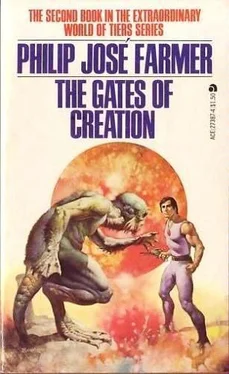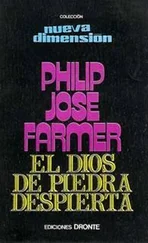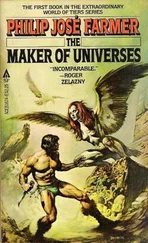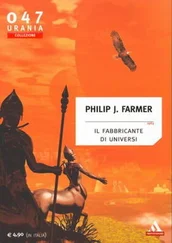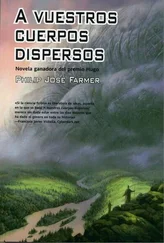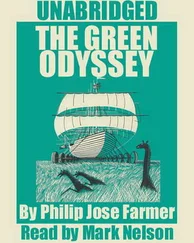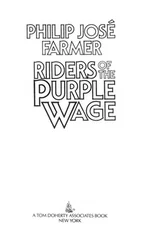The Gates of Creation
by Philip Jose Farmer
Thousands of years ago, the lords had used drugs, electronics, hypnotism, and psychotechniques to do without sleep. Their bodies stayed fresh and vigorous, their eyes unclouded, for days and nights, for months. But their minds eventually crumbled. Hallucinations, unbounded anger, and an unreasonable sense of doom gripped them. Some went mad forever and had to be killed or imprisoned.
It was then that the Lords found that even they, makers of universes, owners of a science that put them only one step below the gods, must dream. The unconscious mind, denied communication with the sleeping conscious, revolted. Its weapon was madness, with which it toppled the pillars of reason.
So, all Lords now slept and dreamed.
Robert Wolff, once called Jadawin, Lord of the Planet of Many Levels, of a world that was constructed like a Tower of Babylon, dreamed.
He dreamed that a six-pointed star had drifted through a window into his bedroom. Whirling, it hung in the air above the foot of his bed. It was a pandoogaluz, one of the ancient symbols of the religion in which the Lords no longer believed. Wolff, who tended to think mostly in English, thought of it as a hexaculum. It was a six-sided star, its center glowing white, each of its facets flashing a ray, a scarlet, an orange, an azure, a purple, a black, and a yellow. The hexaculum pulsed like the heart of the sun, and the rays javelined out, raking his eyelids lightly. The beams scratched the skin as a house cat might extend a claw to wake its sleeping master with the tiniest sting.
“What do you want?” Wolff said, and knew he was dreaming. The hexaculum was a danger; even the shadows that formed between its beams were thick with evil. And he knew that the hexaculum had been sent by his father, Urizen, whom he had not seen for two thousand years. “Jadawin!”
The voice was silent, the words formed by the six rays, which now bent and coiled and writhed like snakes of fire. The letters into which they shaped themselves were of the ancient alphabet, the original writing of the Lords. He saw them glowing before him, yet he understood them not so much through the eye as through a voice that spoke deep within him. It was as if the colors reached into the center of his mind and evoked a long-dead voice. The voice was deep, so deep it vibrated his innermost being, whirled it, and threatened to bend it into nightmare figures that would forever keep their shape.
“Wake up, Jadawin!” his father’s voice said. By these words, Wolff knew that the flashing-rayed hexaculum was not only in his mind but existed in reality. His eyes opened, and he stared up at the concave ceiling, self-luminous with a soft and shifting light, veined with red, black, yellow, and green. He put out his left hand to touch Chryseis, his wife, and found that her side of the bed was empty.
At this, he sat upright and looked to left and right and saw that she was not in the room. He called, “Chryseis!” Then he saw the glittering pulsing six-rayed object that hung six feet above the edge of his bed. Out of it came, in sound, not fire, his father’s voice.
“Jadawin, my son, my enemy! Do not look for the lesser being you have honored by making your mate. She is gone and will not be back.”
Wolff stood up and then sprang out of bed. How had this thing gotten into his supposedly impregnable castle? Long before it had reached the bedroom in the center of the castle, alarms should have wakened him, massive doors should have slid shut throughout the enormous building, laser beams should have been triggered in the many halls, ready to cut down intruders, the hundred different traps should have been set. The hexaculum should have been shattered, slashed, burned, exploded, crushed, drowned.
But not a single light shone on the great wall across the room, the wall that seemed only an arabesqued decoration but was the alarm and control diagram-panel of the castle. It glimmered quietly as if an uninvited guest were not within a million miles.
The voice of Urizen, his father, laughed, and said, “You did not think you could keep the Lord of Lords out with your puny weapons, did you? Jadawin, I could kill you now where you stand gaping so foolishly, so pale and quivering and filmed in sweat.”
“Chryseis!” Wolff cried out again.
“Chryseis is gone. She is no longer safe in your bed and in your universe. She has been taken as quickly and as silently as a thief steals a jewel.”
“What do you want, Father?” Wolff asked.
“I want you to come after her. Try to get her back.”
Wolff bellowed, leaped up onto the bed, and launched himself over its edge at the hexaculum. For that moment, he forgot all reason and caution, which had told him that the object could be fatal. His hands gripped the many-colored glowing thing. They closed on air and came together and he was standing on the floor, looking up above him at the space where the hexaculum had been. Even as his hands touched the area filled by the starred polyhedron, it had vanished.
So, perhaps, it had not been physical. Perhaps it had after all been a projection stirred in him by some means.
He did not believe so. It was a configuration of energies, of fields momentarily held together and transmitted from some remote place. The projector might be in the universe next door or it might be a million universes away. The distance did not matter. What did matter was that Urizen had penetrated the walls of Wolff’s personal world. And he had spirited Chryseis away.
Wolff did not expect any more word from his father. Urizen had not indicated where he had taken Chryseis, how Wolff was to find her, or what would be done to Chryseis. Yet Wolff knew what he had to do. Somehow, he would have to locate the hidden self-enclosed cosmos of his father. Then he would have to find the gate that would give entrance to the pocket universe. At the same time that he got access, he would have to detect and avoid the traps set for him by Urizen. If he succeeded in doing this—and the probabilities were very low—he would have to get to Urizen and kill him. Only thus could he rescue Chryseis.
This was the multimillennia—old pattern of the game played among the Lords. Wolff himself, as Jadawin, the seventh son of Urizen, had survived 10,000 years of the deadly amusement. But he had managed to do so largely by being content with staying in his own universe. Unlike many of the Lords, he had not grown tired of the world he had created. He had enjoyed it—although it had been a cruel enjoyment, he had to admit now. Not only had he exploited the natives of his world for his own purposes, he had set up defenses that had snared more than one Lord—male and female, some his own brothers and sisters—and the trapped ones had died slowly and horribly. Wolff felt contrition for what he had done to the inhabitants of his planet. For the Lords he had killed and tortured, he suffered no guilt. They knew what they were doing when they came into his world, and if they had beaten his defenses, they would have given him a painful time before he died.
Then Lord Vannax had succeeded in hurling him into the universe of Earth, although at the cost of being taken along with Jadawin. A third Lord, Arwoor, had moved in to possess Jadawin’s world.
Jadawin’s memory of his former life had been repressed by the shock of dispossession, of being cast weaponless into an alien universe and without the means to return to his own world; Jadawin had become a blank, a tabula rasa. Adopted by a Kentuckian named Wolff, the amnesiac Jadawin had taken the name of Robert Wolff. Not until he was sixty-six years old did he discover what had happened before the time that he had stumbled down a Kentucky mountain. He had retired from a lifetime of teaching Latin, Greek, and Hebrew to the Phoenix area of Arizona. And there, while looking through a newly built house for sale, he had begun the series of adventures that took him through a “gate” back into the universe he had created and had ruled as Lord for 10,000 years.
Читать дальше
